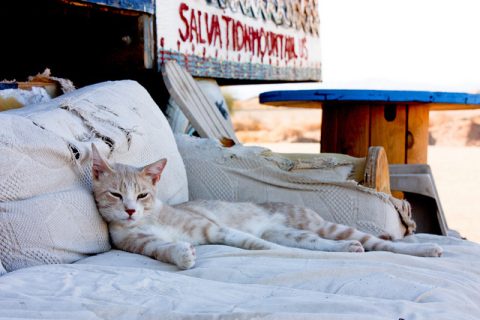I notice that your character spends a lot of time dwelling on images: the blood spots in the yolk, the “dark and heavy” slug, the mountain that turns out to be a cloud. Are you influenced by poetry at all? Can you talk about the importance of images to your work?
I hope that every writer is influenced by poetry. No, let’s say every person. Poetry distills moments into something vivid and felt, lending them a kind of weight in the heart. Some wise teacher once told me that if you could both tell a good story and write like a poet, you were gold. Of course a wise poet once said that nothing gold could stay, but I still try to aspire to that. If you’re going to leave an impression in a reader’s mind, those vivid visuals—even when they’re not actually on-scene but in the character’s head (like the blood spots in the egg yolks)—are crucial.
A lot of the conflict in the story smolders below the surface, just off the page. We have the son she’s struggling to understand, the ex-husband she’s hiding details of her life from, and the breakup with Phil. This feels very Hemingway, in that we only see the tip of the iceberg. Is this approach something you like in flash fiction or even in longer work? Can you talk about why?
Ah, Hemingway. It’s an honor to hear that. Literary fiction asks the reader to make leaps and fill in blanks. Like in real life. You may have an array of facts about someone you know that you think explains a lot of her behavior, but there are so many “off scene” conflicts: things she hasn’t revealed to you, secrets she hasn’t revealed even to herself, and they’re all there beneath every interaction with that person. Fiction is built on the tension of the known and the unknown. That’s part of the striptease of suspense. And so in a tiny story it is especially important to show the slipping edge of the veil but to let the reader imagine what may lie beneath. In flash fiction, it’s a very short peep show. (Note: I recognize that’s a somewhat sexist metaphor, but hey, we did start with Hemingway.)
The main character and her son both place a lot of value on fantasy, the son with his “thick paperback fantasies” and she with her cloud illusions and imaginings about psychotics. Why do you think people need fantasy? What does it give us that reality can’t?
E.M. Cioran wrote, “We are all geniuses in our dreams, the butcher’s the poet’s equal there.” Fantasy allows us to live different, often more glamorous versions of ourselves, to transform without doing the painfully hard work of real transformation. In the earliest version of my story, the son connects his hairy toes to his reading, imagining himself a hobbit-hero. Too literal, so I cut it. But likewise, his mother, though she gives her ex-husband a fantasy version of her vacation that she knows to be false, now fantasizes a sort of tragic role for herself, which is yet another way of refusing a much more mundane reality. She has no idea whether the eggs have blood spots and she goes straight from a visual mirage with the cloud-mountain to imagined violence, again maintaining her sense of central importance, only this time as target. Fantasy assures us that we are important in ways reality rarely does.
What are you trying to do right now in your writing? Is there a particular facet of craft that you are working on, a technique you are struggling with, or just some target you are aiming at in your work?
The short (and crazy-making) answer is everything. I’m always reaching beyond what I think I can do, which means I’ve learned to embrace repeated failure as part of the process. For me, the hardest part of the craft of fiction has always been structure, i.e., discovering the bones that hold a piece together and placing them in the right order—but not so close together that the work can’t move. You always need a little space, and figuring out where and how is always, for me, a struggle.
What’s the last thing you read that you really loved? What did you love about it?
I loved the novel All the Birds, Singing by Evie Wyld. Loved, as in felt awed, moved, and bruised by it, even a little envious of her skills. The voice. The structure of storylines—one moving forward in the present, one moving back through the past to reveal more of the character. The crisp and haunted prose. Of course now I can never use my own story title, “All the Birds Vanish,” as a collection title. But I forgive Wyld, because that novel cut me to the core, and I bow to that rare power.


